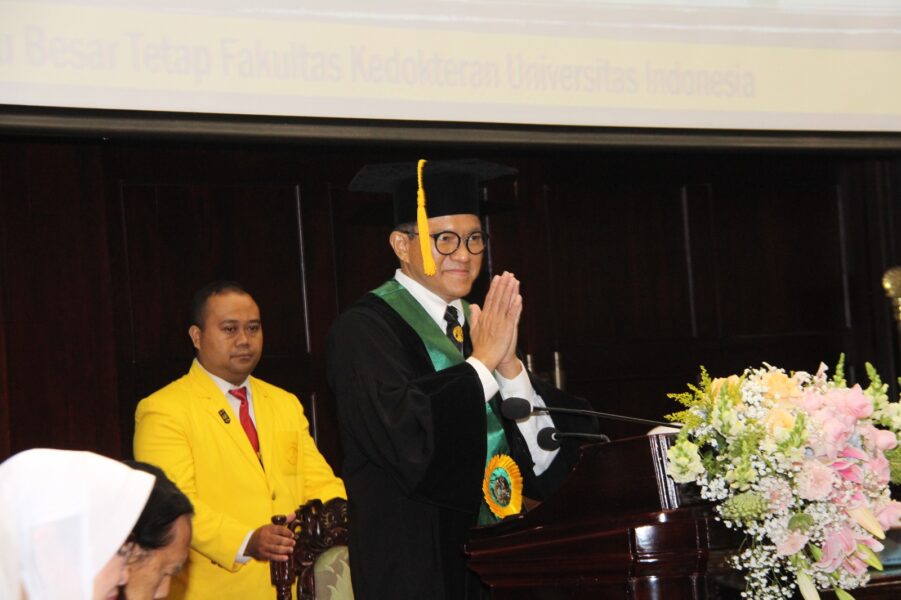Jakarta, August 19th 2023. Prof. Dr. dr. Nur Rasyid, SpU(K) was appointed as Professor in the Field of Urology at the Faculty of Medicine (FK) Universitas Indonesia (UI) in the IMERI Hall, UI Campus, Salemba, this morning (Saturday, 19/8). Rector of Universitas Indonesia, Prof. Ari Kuncoro, S.E., M.A., Ph.D., directly led this inauguration procession and the process was broadcasted virtually via the Universitas Indonesia’s YouTube channel and UI TV. At the inauguration, Prof. Dr. dr. Nur Rasyid delivered his inaugural speech entitled “Development of Kidney Transplantation as a Health Development Model to Reach Golden Indonesia 2045”.

Kidney failure is a condition when the kidneys lose their functions, such as filtering blood, removing waste, and regulating electrolyte and fluid balance in the body. The frequency of decreased kidney function increases with changes in behavior and lifestyle that lead to diabetes, hypertension, urinary tract stones, and infections.
Based on data from the 2020 Basic Health Research (Riskesdas), there has been a constant increase in the number of people with chronic kidney disease from 2018 to 2020. The data showed that 1,602,059 Indonesians suffer from kidney failure and this figure is expected to continue to increase.
According to the 2018 Indonesian Renal Registry (IRR), currently the most widely performed renal replacement therapy is hemodialysis (HD) (97%), peritoneal dialysis (2%), and kidney transplantation (1%). The expenditure of the National Social Security Agency (BPJS) for kidney failure is quite high. In the 2018-2020 period, it reached 6.4 trillion rupiah and continued to increase by 6.5 trillion rupiah for one year’s spending in 2021. Expenditures for kidney failure always rank fourth in total BPJS expenditure. Funding for kidney transplants has been guaranteed by BPJS Health since 2014 because with transplants, the costs incurred by BPJS for the treatment of end-stage kidney failure are much more economical, similar to the cost of 1 time transplantation (around 2.5 to 3 years cost of HD), and the life quality of the transplant patients is better to the point they can resume normal daily activities.
Kidney transplants in Indonesia, which started in 1977, have only increased since October 2011 after the removal of donor kidneys was carried out using a laparoscopic technique. In this technique, a donor is only treated for 3-4 days and can return to their activities after one week. This has resulted in more and more families and relatives of patients with end-stage renal failure willing to become living donors. Although transplants have been started since 1977, until now there have only been 1155 kidney transplants and about 80% of the procedures were performed at dr. Cipto Mangunkusumo (RSCM)
Since the inauguration of the Kanigara Building, currently at RSCM, an average of 3-4 cases of transplantation can be carried out per week. This shortened the waiting list from 1 year to 8 months. Two special operating rooms are still needed for organ transplants in order to shorten the queue list to reduce the risk of complications while waiting for the transplant. Since 2014, RSCM has supported 7 government hospitals throughout Indonesia, but only 2 hospitals, which are Prof. IGNG Ngoerah Hospital in Bali and Djamil Hospital in Padang, have been able to independently carry out kidney transplants. Currently, the Ministry of Health of the Republic of Indonesia (Kemenkes RI) has decided on 17 designated government hospitals to develop kidney transplants.
The kidney transplant journey at RSCM could only be achieved thanks to every element involved, both specialists and paramedics (increasing their respective professionalism), was supported by management policies in service and finance which resulted in synergy to always improve transplant services both in terms of quality and quantity. This can be a model for health services in Indonesia that requires cooperation from various health components or those related to the world of health to achieve a shared vision.
“The orientation is not for personal gain, but for broad interests. Ministry of Health to all levels that deal directly with the community, the ministry of education which oversees universities, medical faculties, lecturers, and all components involved in the education process for general practitioners and specialist doctors. Likewise, the medical profession, which must uphold ethics and morals, must be able to interact well to achieve a shared vision: Golden Indonesia 2045,” said Prof. Dr. dr. Nur Rashid. Appearing to be among the invited guests, Lippo Group Founder Dr. (H.C) Mochtar Riady; President Commissioner of PT Panca Cakra Medika Satria Perdana Sakrawijaya, S.E; and Leader of the Ta’lim Assembly Raudhotus Sholihin, Citapen, Ciawi, Bogor Ir. H. Suyadi Cakrawijaya.
Prof. Dr. dr. Nur Rasyid graduated as a doctor from FKUI in 1989. At the same campus, he earned the title of Urology Specialist in 1999. Then, in 2009 he earned his doctorate at the Bogor Agricultural Institute. Some of his scientific papers that have been published in the last three years, namely the Association Between De Novo C1q-Binding Donor-Specific Anti-HLA Antibodies and Clinical Outcomes After Kidney Transplantation: A Meta-Analysis (2023); Mean platelet volume as a predictive marker of erectile dysfunction: a meta-analysis (20220; and The Impact of the COVID-19 Pandemic on Urology Practice in Indonesia: A Nationwide Survey (2020).



